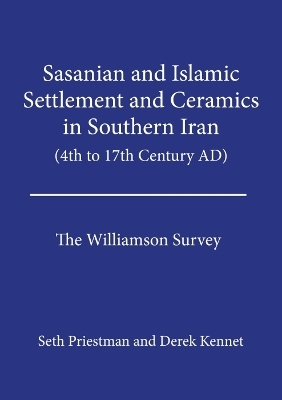
Sasanian and Islamic Settlement and Ceramics in Southern Iran (4th to 17th Century AD)
Casemate Publishers (Verlag)
979-8-88857-052-4 (ISBN)
- Titel nicht im Sortiment
- Artikel merken
This monograph comprises the final publication of a study supported by the British Institute of Persian Studies and undertaken by Seth Priestman and Derek Kennet at the University of Durham. The work presents and analyses an assemblage of just under 17,000 sherds of pottery and associated paper archives resulting from one of the largest and most comprehensive surveys ever undertaken on the historic archaeology of southern Iran. The survey was undertaken by Andrew George Williamson (1945–1975), a doctoral student at Oxford University between 1968 and 1971, at a time of great progress and rapid advance in the archaeological exploration of Iran.
The monograph provides new archaeological evidence on the long-term development of settlement in Southern Iran, in particular the coastal region, from the Sasanian period to around the 17th century. The work provides new insights into regional settlement patterns and changing ceramic distribution, trade and use. A large amount of primary data is presented covering an extensive area from Minab to Bushehr along the coast and inland as far as Sirjan. This includes information on a number of previously undocumented archaeological sites, as well as a detailed description and analysis of the ceramic finds, which underpin the settlement evidence and provide a wider source of reference.
By collecting carefully controlled archaeological evidence related to the size, distribution and period of occupation of urban and rural settlements distributed across southern Iran, Williamson aimed to reconstruct the broader historical development of the region. Due to his early death the work was never completed. The key aims of the authors of this volume were to do justice to Williamson’s remarkable vision and efforts on the one hand, and at the same time to bring this important new evidence to ongoing discussions about the development of southern Iran through the Sasanian and Islamic periods.
Seth M. N. Priestman is an archaeologist and ceramic specialist with a track record of research and publication across Arabia, Iran, the Caucasus, East Africa, and Japan from the post-Iron Age to the 20th century. His main research focuses on long term changes in the maritime economy of the Indian Ocean region and the Gulf using ceramic finds as a proxy for wider historic reconstruction. He has previously held research positions with the British Museum, and the Universities of Durham, Edinburgh, and Southampton. He has also worked widely in private consultancy for museum development and heritage protection projects across the GCC. He currently holds the post of Honorary Research Fellow in the Department of Archaeology at Durham University. Derek Kennet is a lecturer in the Department of Archaeology at Durham University. He has been conducting archaeological fieldwork in Arabia for over 30 years, having worked in Kuwait, the UAE and Oman. He completed a PhD on the archaeology of Ras al-Khaimah at the School of Oriental and African Studies, London.
List of figures
List of tables
Preface
Conventions and explanatory notes
Acknowledgements
1. Introduction
2. The Williamson Collection
2.1 An archaeological career
2.2 Survey methodology and concept
2.3 Processing the Collection
3. Testing the reliability of the survey
3.1 Issues of interpreting the data
3.2 Site card analysis
3.3 Stein/Williamson comparison
3.4 The Bushehr Hinterland Survey (2004–2005)
3.5 The Hormuzgan Survey (2005)
3.6 The Williamson Collection in Tehran
3.7 Reliability of the survey results
4. Regional settlement patterns
4.1 Regional surveys
4.2 Analysis of settlement change
5. Patterns of ceramic distribution
5.1 Regional reorientation of ceramic production
5.2 Eastern trade
6. Conclusion
Appendix I — Class catalogue
Appendix II — Fabric catalogue
Appendix III — Site catalogue
Appendix IV – Pottery forms
Colour plates
Published sources
Williamson archive sources
| Erscheinungsdatum | 01.08.2023 |
|---|---|
| Zusatzinfo | 250 b/w illustrations and 32 colour images |
| Sprache | englisch |
| Maße | 210 x 297 mm |
| Themenwelt | Geisteswissenschaften ► Archäologie |
| Geisteswissenschaften ► Geschichte ► Regional- / Ländergeschichte | |
| ISBN-13 | 979-8-88857-052-4 / 9798888570524 |
| Zustand | Neuware |
| Informationen gemäß Produktsicherheitsverordnung (GPSR) | |
| Haben Sie eine Frage zum Produkt? |
aus dem Bereich


